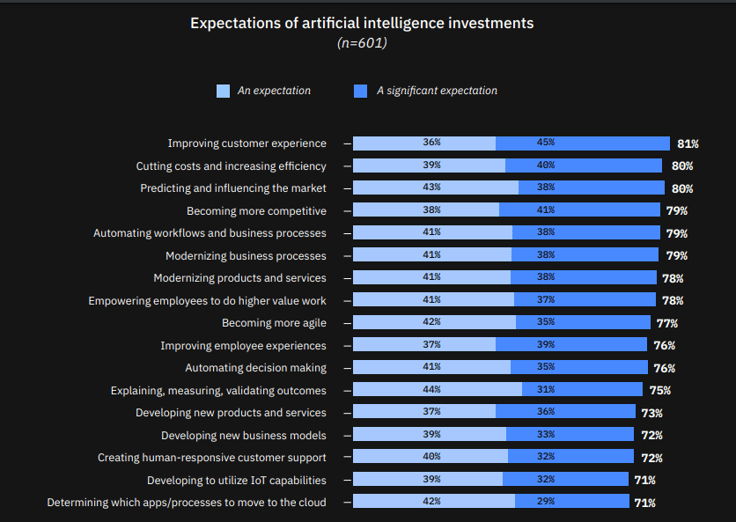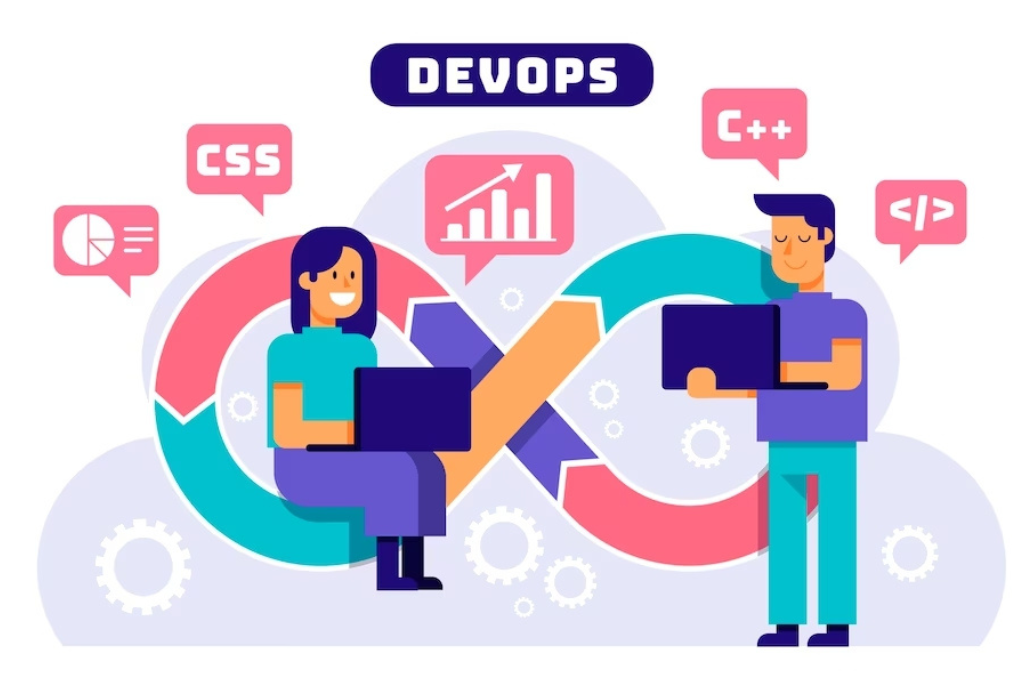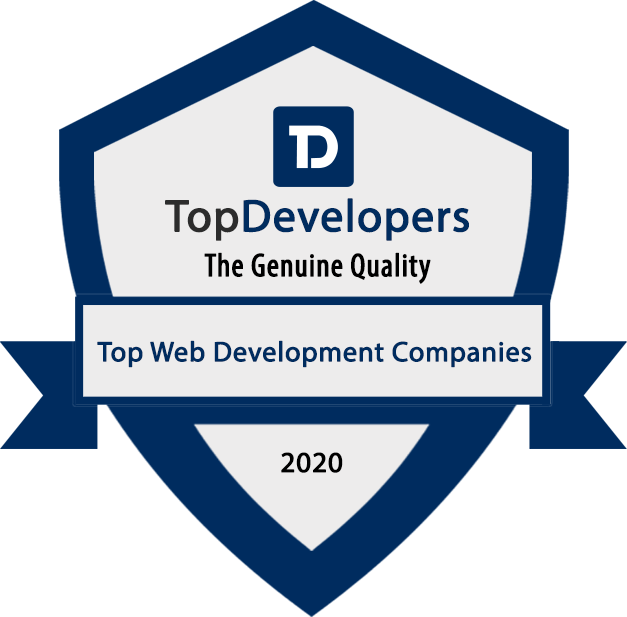Envisioning a future with AI, one might wander in streams of smart cities, self-driving cars, intelligent robots, robocops, and whatnot. However, there is much more to artificial intelligence than the vision conjured by sci-fi movies. This technology has the power to transform the way we interact with devices, ingest information, do our work, and much more.
Indeed, the list would be endless, and we could go on forever if we started delving into AI use cases in all scenarios.
But that’s not what we’re here for.
In this blog, we are talking about the transformational effect of AI on enterprises and their operations.
Enterprises ingest large volumes of data through multitudes of processes, users, documents, and more. Stockpiling large amounts of data is one thing, but being able to extract actionable insights from this is what will set companies up for true digital transformation.
Much is expected from AI in the enterprise.
For years, there has been a rage on what AI can do for enterprises. But not many have been able to unleash its true potential. Today, with the introduction of AI foundation models and AI APIs like OpenAI, AWS AI, Azure AI, and more, there is a newfound understanding of what is achievable with artificial intelligence.
With advances in AI and its foundation models, enterprises will continue to unlock greater potential to extract valuable, actionable insights from data and use it to speed up, simplify, and streamline processes. Today, they can embed or integrate AI and ML algorithms and even AI APIs into digital products and applications to improve existing business processes or their offerings.
Let’s analyze this further by understanding the key benefits of AI for enterprises and businesses.
Benefits Of Using AI In Enterprise Business Operations
The core use of artificial intelligence in large-scale organizations is to capture, analyze, and learn from the data collected from legacy or current applications. By deploying AI in an enterprise, businesses can train the bots.
-
Improve Speed of Information Analysis
Humans have greater cognitive capabilities than machines. Unless we are talking about artificial superintelligence (ASI). However, when it comes to analytical capabilities and speed, humans are no match for AI or robots.
.png?width=536&height=356&name=AI%20In%20enterprise-document%20processing%20(2).png)
-
And what good is the massive amounts of data collected in enterprise systems if one is not able to extract information from them in time to make rightful decisions? With artificial intelligence, one can very swiftly analyze data and offer insights in real time. It can even infer data or information fed in by the users and generate responses or address their issues.
-
Increase Accuracy & Reliability Of Outputs
Manual work is prone to errors. No matter how big or expert a team one deploys to analyze data and yield valuable insights, it will have some errors. However, that’s exactly where AI shines. AI eliminates any chance of error in work and increases the output's accuracy and reliability. Running on a set of predefined algorithms, artificial intelligence can capture data from different sources and analyze it accurately to eliminate even the smallest errors. The advanced AI algorithms let nothing slip through the cracks, and the output is much more refined and reliable than manual data monitoring or analyzing.
-
Tackle a Larger Magnitude Of Data In Less Time
Speed is where AI beats humans. In an enterprise, hundreds of data collection points capture information from different sources. It could be Enterprise Resource Planning (ERP), Content Management System (CMS), Customer Relationship Management (CRM), Knowledge Management System (KMS), Executive Support System (ESS), Decision Support System (DSS), Transaction Processing System (TPS), or any other for that matter. Analyzing the massive data sets created by such unstructured data is humanly impossible. AI tools and APIs can be integrated into the systems to tackle any amount of data in less time.
-
Enhance Employee Productivity
AI has the capability to automate routine tasks, offer general support, and improve collaboration. By deploying AI within an enterprise, businesses can free up their employees to handle more creative and innovative tasks. By automating repetitive tasks, one can ensure their employees take up higher-value tasks. In fact, an IBM report suggests that almost 78% of enterprises expect to empower employees to take up higher-value tasks with AI investment.

The same report also suggested that 76% of respondents believe in improving employee experience by investing in AI. Not just that, there are several large-scale enterprises in the US that plan on using artificial intelligence to train their employees and enhance their skill sets. No wonder the coming years will witness a change in the trend of how enterprises improve their employees’ and workforce productivity by deploying AI to tackle major tasks.
-
Promise Operational Excellence
One of the key benefits of integrating enterprise systems with artificial intelligence is the operational excellence that it promises. It can be used to automate workflows and unleash the full potential of data for decision-making. With AI, enterprises can find answers to questions they couldn’t even think of asking.
.png?width=450&height=299&name=AI%20In%20enterprise-document%20processing%20(3).png)
Be it any business process, AI can help drive efficiency by finding patterns within data and making better business decisions. Enterprises can integrate systems with AI for real-time analytics, intelligent automation, and predictive analytics to improve performance while reducing overall costs.
-
Provide Customer Satisfaction
This is one of the most talked about aspects of artificial intelligence. Enterprises can also leverage AI to offer personalized customer experiences, driving satisfaction. With generative AI and AI chatbots delivering round-the-clock support, offering personalized recommendations, and customizing the complete experience based on previous interactions, AI can enable enterprises to improve their customer experience. Using predictive analytics and big data together, AI can paint a comprehensive picture of their customer profile and help them analyze their needs, wants, and behavior.
-
Make IT Systems More Proactive
Another benefit of employing AI automation of integrations into your enterprise systems is that it makes your overall IT system more proactive. It can easily sift through the large corpus of data and offer actionable insights in a matter of seconds. Rather than being reactive, AI helps businesses become more proactive in their approach. AI tools can track patterns and anomalies to predict security threats, risks, future updates, and more, enabling businesses to take proactive steps beforehand to keep their IT systems running smoothly.
For instance, AI tools can analyze a sudden increase in traffic or users on a SaaS product and alert the cloud manager to scale the load automatically.

AI Use Cases To Improve Business Processes
While the use cases of AI across industries may differ, its ability to streamline, automate, and speed-up business processes and operations remains constant. Especially when we talk about enterprises!
The enterprise architecture is a vast web of processes, touchpoints, management components, IT assets, and other variables. And each of these is interconnected. No wonder one can find multiple areas to deploy AI for robotic process automation.
Employees interact with the legacy systems through multifaceted internal processes, while many customer-facing processes respond to customer interactions.
Use Case #1. Business Metrics Analytics
Detecting anomalies in business metrics can help make more informed decisions, forecast outcomes, and plan for the future. One can create solutions or integrate their enterprise application with AI-powered APIs to accurately analyze large volumes of data based on present business requirements. One can build forecasting and anomaly detection models to read through the business metrics and generate actionable insights for the future.
Enterprises can use it to track, forecast, and get actionable analytics for sales, marketing, IT monitoring, inventory, digital experience, and more to plan better.
Use Case #2. Document Processing
Enterprises have tons of documents coming in and being transferred among departments in all forms and types. Managing these documents efficiently, including implementing language translations where necessary, is crucial for maintaining effective communication and operations. These could be through forms, applications, invoices, etc., with very crucial information contained in them. Processing data and yielding information from these documents manually can be a very tiresome task. And it’s prone to errors.
With AI, enterprises can integrate their systems with several capabilities to extract information from printed text, handwritten documents, and more. These AI integrations or solutions can be implemented across the customer-facing parts of the application or even in pipelines where documents are shared inter and intra-departments. This can save a lot of time and effort, and even make the entire process more efficient and error-free.

The rate of accuracy is very high when enterprises place the responsibility of extracting and processing data in the hands of a machine running on your pre-set algorithms. Enterprises spanning healthcare, insurance, capital markets, Fintech, banking, manufacturing, legal, and more can benefit from this.
Use Case #3. Customer Service
One of the most popular use cases of AI in the enterprise is customer service. The majority of businesses have already deployed AI-powered chatbots to interact with their customers at different parts of the customer journey. And with generative AI becoming stronger with each passing day, there is no doubt that customer service will become even more automated. Conversational AI interfaces that combine different streams of natural language processing can add human-like conversation capabilities to systems for better outputs.
.png?width=536&height=356&name=AI%20In%20enterprise-document%20processing%20(1).png)
Enterprises can get chatbot development and train generative AI models like GPT-4 or AWS AI integrations to offer personalized interactions to customers. And the customers expect no less. Whether it is looking for answers from the knowledge base, offering solutions based on queries, or interactions for simpler things, enterprises can use AI to power a plethora of their customer-facing processes. This, in turn, would empower enterprises to optimize customer experience, enhance customer satisfaction, and retain them for longer.
Use Case #4. Workflow Management
Seamlessly managing workflows throughout the enterprise is a big challenge for several enterprises, considering the countless processes they have to deal with. Fine-tuning the existing foundation models of AI with existing enterprise systems is one of the fastest and most effective ways to manage enterprise processes. While businesses have been using workflow automation AI like IBM AI Enterprise Workflow to manage their processes, with the evolution of new-age foundation models, AI would be more around integrating AI within existing systems to prioritize business operations and automate workflows.
It can be used to increase productivity in inventory management, supply-chain management, and several other tasks taking place in the enterprise.
Use Case #5. Process Discovery
Process discovery is the unveiling of hidden nuances, variations, and bottlenecks within processes to drive operational excellence. It defines, outlines, and analyzes every internal process in a business to paint the complete picture of the enterprise process. There are different process variants and operational nuances that limit the scope of the business process picture. Computer vision, a field of artificial intelligence, can be used to identify the process steps through screen scanning and offer a better view of the process as a whole. This discovery could lead to several successful opportunities in terms of automation and hyper-automation for enterprises.
.png?width=536&height=356&name=AI%20In%20enterprise-document%20processing%20(4).png)
Many enterprises that have already automated several processes can use AI to discover other processes that can be automated. It can analyze the sequence to identify ways in which the process working can be made more efficient and automated.
Use Case #6. Fraud Detection
Rule-based fraud detection hasn’t proved accurate enough for most organizations. Otherwise, despite having so many mechanisms in place, why would organizations still continue to lose tens of billions of dollars in fraudulent activities?
.png?width=536&height=356&name=AI%20In%20enterprise-document%20processing%20(5).png)
Enterprises can integrate their existing systems or applications with AI APIs like AWS Fraud Detector to add automated fraud detection capabilities. Enterprises can also join hands with AI development companies to build an internal fraud detection system using Amazon SageMaker and other similar tools to make it more specialized to their business requirements.
Integrating with such AI capabilities can help detect fraudulent activities in real time and take remediation measures immediately.
Use Case #7. Decision-Making
The most efficient aspect of AI in terms of enterprises is decision-making. While several AI tools offer data analytics and actionable insights, with the evolution of new AI foundation models like GPT, these can be trained on pre-set data to make even better decisions.
The best part is instead of using the existing tools for decision-making, enterprises can use foundation models to integrate within their existing systems and unleash the full potential of their data. By implementing AI foundation models like generative AI, NLP, or data analytics within their systems, businesses can propel forward, analyze patterns, and find opportunities for the next actions with speed and accuracy.
Use Case #8. Intelligent Information Search
As a majority of data is scattered across different applications, unstructured and in silos, searching for information within systems can be a very time-consuming task, leading to a decline in workforce productivity. Making employees sift through unrelated links and unnecessary documents would only make them less productive and eventually lose their zeal for the task.
Now, large-scale enterprises can implement search services within their organizations to make their applications intelligent in returning accurate results. The end result- no frustration during the search experience and speedy task completion with accurate answers. Not just for the internal users, enterprises can also incorporate similar functionalities for their customers. They can use AI APIs like AWS Kendra to make their chatbots smarter and return accurate results based on their search terms.
Use Case #9. Process Re-engineering
Re-designing and re-engineering existing processes is crucial for enterprises to improve work and processes. Enterprise CTOs and CIOs can leverage the power of AI to do the same with much less effort. Since the 90s, enterprises have been using data to make decisions.
AI does the same but faster.
.png?width=536&height=356&name=AI%20In%20enterprise-document%20processing%20(4).png)
Today, one can deploy AI and make it learn from large data sets to make accurate predictions and operational decisions. For instance, the banking sector is using AI-driven process re-engineering to transform how they offer wealth advice. The insurance sector is using it to automate claim estimates, onboarding, and even underwriting. No wonder enterprises would be seen re-designing their entire systems with AI at the center to become more digitally advanced, enhance productivity, and improve the quality of outputs.
Use Case #10. DevOps
Enterprises face several challenges like security, concurrency, expertise, and more when it comes to implementing DevOps. With AI becoming ubiquitous, enterprises can now integrate AI to make the entire process and mechanism more automated and innovative. It can enable rapid iteration cycles with CI/CD, continuous production monitoring, and more to eliminate slow innovation and infrequent deployments.
As organizations shift towards adopting DevOps, integrating artificial intelligence within the process can help with several things, like automatic detection and resolution of operational issues, continuous monitoring for improved code quality, optimized application performance, and enhanced security for process vulnerabilities.
Use Case #11. Product Development Improvement
Several enterprises build their digital center of excellence elsewhere to build and maintain their digital products or enterprise systems. However, there are certain products that require an in-house development team for better processing.
With AI’s generative design stream, one can generate product designs based on the specifications mentioned. One can reduce human efforts and get their MVP development with data that is rapidly validated. Not just the creative process there are several other ways in which AI can improve the overall product development process for enterprises. Even for writing codes, error detection, predicting deployment failures, and security, AI can be a game-changer in improving the overall product development process.
Use Case #12. Lead Generation
Another application of AI for the enterprise is in generating leads. Artificial intelligence would prompt a number of marketing activities, and lead generation would play a crucial role in it. These AI bots can be trained to interact with users based on their engagement preferences to convert them into prospects.
On An Ending Note…
Simulating the imagination of organizations, generative AI, NLP, and other AI models are enabling enterprises towards digitization. There are opportunities in abundance when it comes to enterprises using AI to transform their business.
With AI becoming a ubiquitous technology, every business desires to be called an AI company or AI-driven organization. They want to integrate their existing processes and systems with AI or want to build new offerings that are powered by artificial intelligence. Whether they use generative AI, Natural Language Processing, Automation, Machine Learning, or other foundation models of AI, integrating AI is the way to propel.
However, integrating systems with AI capabilities or building new enterprise products or microservices with AI technology isn’t as simple as it sounds. As AI is a pretty new technology, finding experts who can handle your requirements can be challenging.
That’s where an AI development company can come in and help. They can bring in their expertise with technology to integrate your products with the power of artificial intelligence and its other foundation models. They can help you with new product development embedded with AI capabilities, adding AI features to existing products, or even building microservices and features for your enterprise systems. No matter what use case of AI in an enterprise you want to tap into, an AI development company can help you.


















.png)








